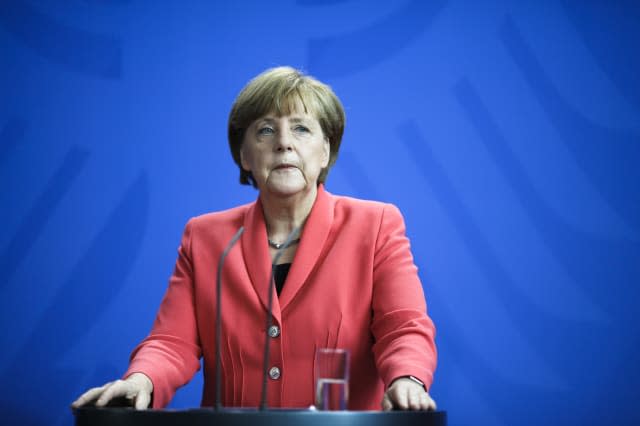Call for 'credible' Greek bailout plan

It is for Greece to come up with "serious, credible" new proposals to deal with the country's debt crisis, Athens was warned as eurozone leaders gathered for an emergency summit to discuss its future in the single currency.
German chancellor Angela Merkel said the door remained open to new talks after strict austerity measures demanded as part of a bailout package were roundly rejected in a referendum by the Greek people.
But she said the conditions for reopening negotiations "are still not in place and that is why we wait to see the detailed proposals" from the radical left Syriza government led by Alexis Tsipras.
The urgency of the scramble for a united approach was underlined by the prospect of still tighter restrictions on cashpoint withdrawals as the European Central Bank (ECB) kept the screw on Greece's teetering banks.
It raised the amount of collateral the banks - which will now remain shut at least until Thursday - must provide as security against emergency lending, with some reportedly on the brink of running out of cash.
Downing Street has made clear Prime Minister David Cameron believes Athens and its eurozone partners must work together on a sustainable solution to the problems caused by Greece's failure to keep up interest payments on its international debts.
Neither Number 10 nor Chancellor George Osborne would be drawn on whether they favoured a Greek exit from the single currency - the outcome which many in Europe had suggested pre-vote would be the result of a referendum 'no'.
Mr Osborne told MPs the "prospects of a happy resolution to this crisis are sadly diminishing" and warned that the UK would not escape the fallout despite remaining outside the eurozone.
A full summit of all 28 European Union member states has not been ruled out should the talks produce repercussions for the whole group.
Eurozone finance ministers will meet first - including mild-mannered Euclid Tsakalotos, appointed by Syriza after the combative Yanis Varoufakis resigned in a show of willing to forge a new deal.
In the evening Mr Tsipras - who has also bolstered his negotiating position off the back of the referendum win by securing the backing of all the country's opposition parties to resume talks - will address fellow leaders.
But in an uncompromising joint message after preparatory talks in Paris, Ms Merkel and French president Francois Hollande said Athens had yet to demonstrate that it was ready to shoulder its share of responsibility.
Demands for further debt relief are likely to be one major sticking point, with several eurozone countries seeking a hard line against Greece for fear of other struggling countries seeking similar deals.
As they began a working dinner to discuss the crisis, Ms Merkel and Mr Hollande each delivered a brief statement in which they made clear they respected the democratic verdict of the Greek people to reject the bailout terms.
But the German chancellor made clear she saw the rejected terms as being "very generous".
"The door remains open to discussions. That is why the eurozone heads of state and government will meet tomorrow," she said.
"But at the same time the conditions for going back into new discussions on concrete proposals are still not in place and that is why we wait to see the detailed proposals from the Greek prime minister."
Mr Hollande noted that all Greek political parties had stated a desire to keep the country in the single currency.
"It is up to the Greek government now to make the serious, credible proposals necessary for that to be able to happen," he said - warning that time was short to find a solution.
Spanish prime minister Mariano Rajoy said: "The important thing is that Greece needs to know that we are inclined to help but there have to be reforms."
A likely sticking point is any demand to write-off more debt.
With limits imposed on withdrawals, British tourists have been warned to take sufficient cash to cover expected costs and emergencies and to ensure they have supplies of their usual prescription medicines in case of shortages.
Pensions continue to be paid as normal to expat Britons living in Greece and measures have been put in place to support British firms facing cashflow problems as a result of capital controls imposed by the Greek government.
Staffing levels have been increased at the UK embassy in Athens, and more consular staff have been deployed on the islands of Crete, Corfu, Rhodes and Zakynthos to help British nationals.

Read more on AOL Money:
Could there be problems with Greek euros?
Best and worst places for holiday cash
Eurostar delays: make sure you claim compensation



